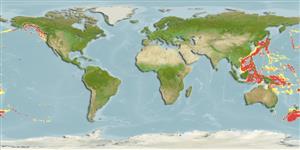Common names from other countries
Classification / Names / Names
आम नाम | उपशब्द | Catalog of Fishes (gen., sp.) | ITIS | CoL | WoRMS
Environment: milieu / climate zone / depth range / distribution range
पारिस्थितिकी
; गहराई सीमा 96 - 2330 m (Ref. 81020). Tropical
Pacific Ocean, Northwest Atlantic and Antarctic Atlantic: South China Sea and South Georgia.
Length at first maturity / आकार / वज़न / Age
Maturity: Lm ? range ? - ? cm
Life cycle and mating behavior
परिपक्व अवधि | पुनरुत्पत्ति | मछलीऔ का अंडे देना | अंडे | Fecundity | लार्वा
Members of the class Ophiuroidea are mostly gonochoric, others are protandric. Fertilization is external. Brooding is common, bursae is used as brood chambers where the embryos develop into juveniles and later crawl out from the bursal slits. Life cycle: Embryos hatch into free-swimming planktotrophic larvae and later metamorphose into tiny brittle stars which sink down the bottom where they grow into adult form.
Bisby, F.A., M.A. Ruggiero, K.L. Wilson, M. Cachuela-Palacio, S.W. Kimani, Y.R. Roskov, A. Soulier-Perkins and J. van Hertum. 2005. (Ref. 19)
IUCN Red List Status (Ref. 130435)
CITES status (Ref. 108899)
Not Evaluated
Not Evaluated
Human uses
| FishSource |
साधन
अधिक जानकारी
Age/Size
बाढ़
Length-weight
Length-length
आकृति विज्ञान
लार्वा
बहुतायत
इंटरनेट स्रोत
Estimates based on models
Preferred temperature
(Ref.
115969): 0.3 - 10.1, mean 6.2 (based on 550 cells).
Price category
Unknown.
